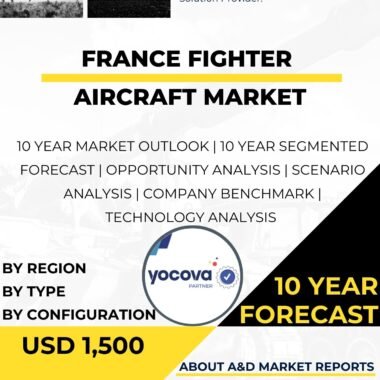Description
The Saudi Arabia Fighter Aircraft Market is a crucial and dynamic segment within the country’s defense industry, focused on the procurement, modernization, and integration of advanced fighter aircraft for the Royal Saudi Air Force (RSAF). As a key player in the Middle East region, Saudi Arabia places significant emphasis on maintaining a modern and well-equipped air force to safeguard its national security interests, contribute to regional stability, and bolster its defense capabilities.
Fighter aircraft are the backbone of any air force, providing the ability to project power, conduct air superiority missions, and support ground and naval operations. The RSAF has historically relied on advanced fighter aircraft to secure its airspace, defend its borders, and participate in international military operations.
The Saudi Arabia Fighter Aircraft Market is characterized by a mix of international and domestic companies that specialize in fighter aircraft development and manufacturing. International defense companies, such as Boeing, Lockheed Martin, and BAE Systems, have a significant presence in the market and offer a wide range of advanced fighter aircraft solutions.
One of the primary drivers of the Saudi Arabia Fighter Aircraft Market is the RSAF’s continuous efforts to modernize its air fleet and enhance its combat capabilities. The RSAF operates a diverse fleet of fighter aircraft, including F-15s, Eurofighter Typhoons, and Tornados, among others. Upgrading and acquiring advanced fighter aircraft is a strategic priority for the RSAF to maintain air superiority, protect its territorial integrity, and ensure its operational readiness.
Additionally, the RSAF’s involvement in regional conflicts and international military operations underscores the importance of advanced fighter aircraft. Fighter jets are essential for conducting precision strikes, conducting reconnaissance missions, and providing air support to ground forces. The RSAF’s capabilities in this area enhance its operational flexibility and ability to address potential security threats in the region.
The Saudi government’s Vision 2030 economic diversification plan also influences the Fighter Aircraft Market. As part of this vision, Saudi Arabia aims to develop a robust domestic defense industry capable of contributing significantly to the national economy. This includes fostering partnerships and joint ventures with international defense companies for technology transfer and knowledge sharing.
Localization of fighter aircraft maintenance, modernization, and integration aligns with the broader goal of creating high-skilled job opportunities for Saudi citizens and promoting research and development within the country.
The RSAF’s focus on modernizing its air fleet involves both acquiring new fighter aircraft and upgrading existing ones. Upgrading existing aircraft with advanced avionics, communication systems, and weapons enhances their capabilities and extends their service life, providing a cost-effective approach to maintain air superiority.
The effective integration of advanced fighter aircraft into the RSAF’s existing fleet demands careful planning and coordination. Ensuring interoperability with other military systems, data sharing, and collaboration between various branches of the military are essential for maximizing the aircraft’s combat effectiveness.
However, the Saudi Arabia Fighter Aircraft Market also faces challenges. Developing and acquiring sophisticated fighter aircraft requires substantial financial investment and continuous research and development efforts to stay at the forefront of technological advancements. The RSAF must balance its operational requirements with budget constraints to ensure a modern and effective air fleet.
Moreover, fighter aircraft acquisition and maintenance involve complex negotiations with international defense companies and governments, requiring extensive technical expertise and diplomatic engagement.
In conclusion, the Saudi Arabia Fighter Aircraft Market is a vital component of the country’s defense industry. As the RSAF continues to modernize its air fleet and enhance its combat capabilities, the demand for advanced fighter aircraft is expected to grow.
International defense companies with expertise in fighter aircraft development and manufacturing will continue to play a significant role in this market. However, the Saudi government’s focus on economic diversification and indigenous defense industry development will drive increased collaboration and technology transfer initiatives.
By fostering local research and development, training programs, and investments in fighter aircraft technology and infrastructure, Saudi Arabia aims to build a robust and self-sufficient defense fighter aircraft sector, ensuring the RSAF remains operationally effective and prepared to meet future challenges.
As the Kingdom seeks to maintain regional stability and safeguard its national interests, the Fighter Aircraft Market will remain a critical area of focus within the broader defense modernization efforts.




